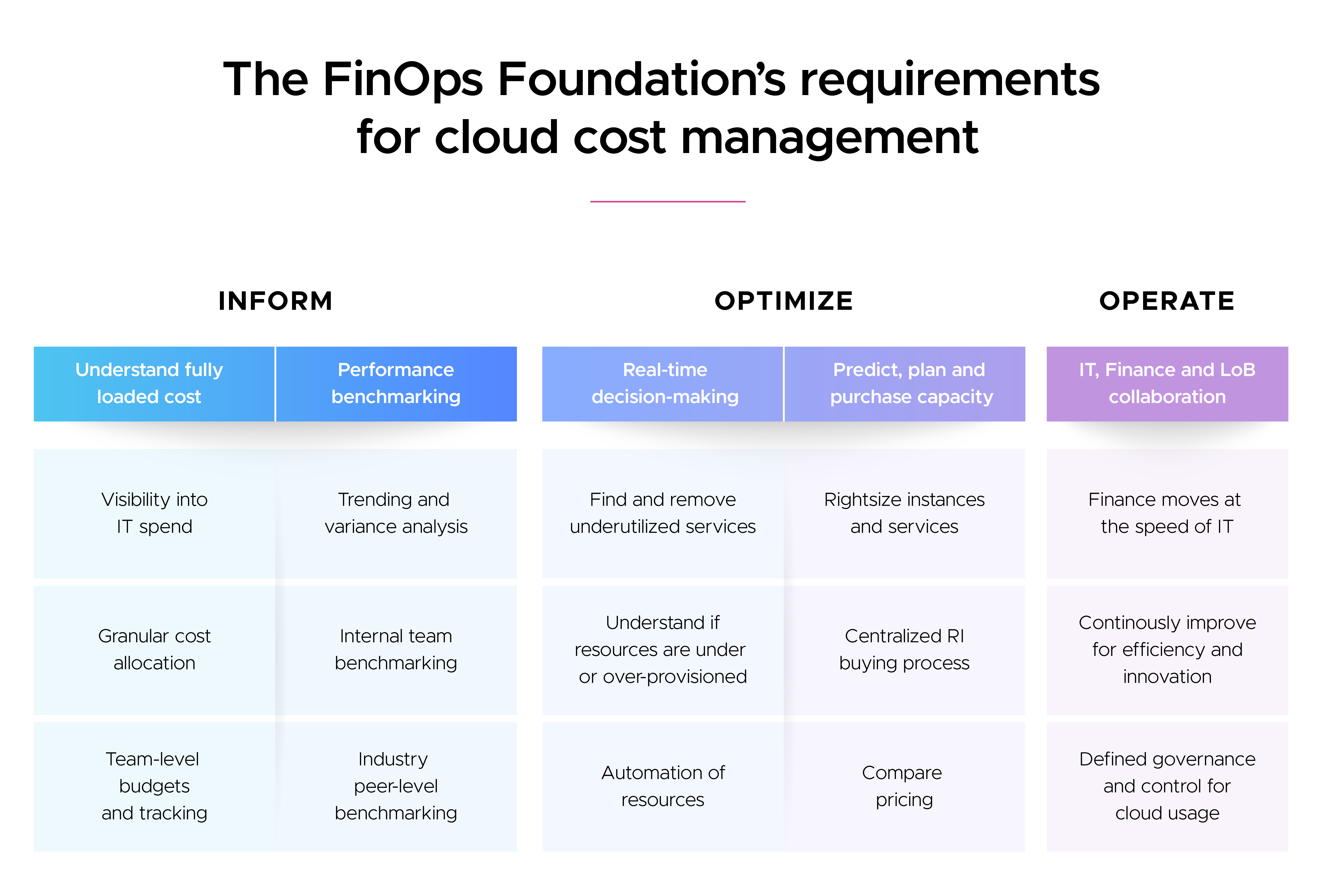Cloud Financial Management has evolved into a pivotal aspect of modern businesses harnessing Cloud services. Financial Operations (FinOps) serves as the linchpin in ensuring efficient Cloud cost management. This comprehensive guide aims to delve deeply into the significance of FinOps services, emphasizing the necessity of building a robust team and culture around it while exploring key elements essential for effective Cloud Financial Management.
Understanding FinOps: Navigating Cloud Financial Management
In today's tech-driven landscape, the Cloud has revolutionized how businesses operate. However, this scalability often brings complexities in managing costs effectively. FinOps bridges this gap, merging financial best practices with technological innovation. It optimizes Cloud spending by aligning resources with actual needs while maintaining performance and scalability.
The Core Principles of FinOps
At the heart of FinOps lie fundamental principles that guide its implementation:
Visibility and Transparency
Providing clear insights into Cloud expenditure to stakeholders, ensuring transparency in cost allocation, and enabling informed decision-making. In Cloud FinOps services, visibility and transparency are the bedrock for effective cloud cost management. It entails providing comprehensive insights into cloud expenditure, not only to decision-makers but also to every stakeholder involved in the cloud operations pipeline. This transparency ensures that the financial implications of cloud usage are clear to everyone, enabling informed decision-making at all levels of the organization. Transparent cost allocation involves breaking down expenses in a detailed manner, and attributing costs to specific projects, departments, or individuals responsible for resource usage. Reporting tools offering trend analysis inform stakeholders about usage and expenses, aligning cloud spend with business goals. While visibility, along with internal benchmarks, promotes best practices and enhances cloud financial management, external benchmarks offer a wider perspective on progress.
Accountability and Responsibility
The principle of accountability and responsibility in AWS FinOps revolves around fostering a culture where teams take ownership of their cloud usage. It involves instilling a sense of responsibility among individuals and teams, making them cognizant of the financial implications of their actions in the cloud environment. When teams understand how their decisions impact costs, they become more proactive in optimizing cloud resources and ensuring cost efficiency.
Creating a culture of ownership encourages teams to actively participate in cost management. This might involve setting clear guidelines, establishing budgets for projects, or implementing policies that incentivize cost-conscious behaviors. It's about empowering teams to make decisions aligned with both their operational needs and the financial objectives of the organization.
Efficiency and Optimization
Continuously refining processes to optimize resource utilization, ensuring cost efficiency without compromising performance. It's not merely about reducing costs but rather about maximizing value from cloud investments. This principle emphasizes the importance of regularly reviewing and fine-tuning cloud resources to eliminate waste and enhance efficiency. It involves assessing whether the current resource allocations are aligned with actual needs and making adjustments accordingly. This might include rightsizing instances, using reserved instances effectively, or adopting serverless architectures to optimize costs without compromising functionality.

The Value of Embracing Cloud FinOps
Implementing AWS FinOps practices yields numerous tangible benefits:
- Cost Efficiency: Cloud FinOps methodologies serve as a strategic approach to scrutinize cloud expenditure, enabling organizations to pinpoint and eliminate unnecessary costs. By leveraging detailed analytics and optimization techniques, companies identify areas where resources are underutilized or overspent, leading to substantial cost reductions.
- Collaboration between teams: FinOps transcends traditional departmental barriers, fostering collaboration among finance, operations, and IT teams. By encouraging shared responsibility for cost management, Cloud FinOps creates a cohesive environment where teams collectively work towards optimizing cloud spending. This collaborative culture not only enhances cost control but also promotes innovative solutions and cross-functional understanding.
- Continuous Improvement: Central to FinOps is the principle of continual enhancement in cost management strategies. Organizations employing AWS FinOps adopt an iterative approach to refine their cloud cost management techniques. This involves regularly reassessing spending patterns, identifying optimization opportunities, and adapting strategies to evolving business needs. This iterative refinement drives ongoing efficiency and adaptability in a dynamic cloud environment.
Building a FinOps-Centric Team
People: The Cornerstone of Success
- Leadership Support: Securing buy-in from top leadership to instill a cost-conscious culture across the organization, setting a precedent for prudent financial practices.
- Cross-functional Collaboration: Bringing together diverse skill sets from finance, operations, and IT to address cost management challenges holistically, fostering innovation through varied perspectives.
- Skill Development: Investing in training programs and workshops to equip teams with Cloud FinOps expertise, enabling them to leverage tools and strategies effectively.
Principles: Guiding the Way
- Data-Driven Decisions: Leveraging analytics to make informed choices about resource allocation and usage, ensuring data-backed decision-making and accurate predictions.
- Automation and Tooling: Implementing automated tools for continuous monitoring, analysis, and optimization, minimizing manual errors and improving operational efficiency.
- Cost Accountability: Instilling a culture where teams understand the financial implications of their actions, promoting a sense of ownership and responsibility in cost management.
Processes: The Operational Backbone
- Budgeting and Forecasting: Creating accurate forecasts and budgets based on historical data and business projections, enabling better cost predictability and resource allocation.
- Continuous Monitoring: Regularly assessing spending patterns and optimizing resource allocation accordingly, facilitating proactive cost management and optimization.
- Governance and Compliance: Implementing policies and controls to ensure compliance with industry standards and internal regulations, mitigating risks associated with non-compliance and overspending.
Technology: Empowering Efficiency
- AWS Cloud Cost Management Tools: Leveraging specialized tools for real-time visibility into cloud spending and resource utilization, aiding in identifying optimization opportunities and cost-saving measures.
- AI and Machine Learning: Utilizing advanced technologies to predict and optimize cloud usage patterns, enhancing efficiency and cost-effectiveness through predictive analytics. AI-driven predictive analytics provide insights into future usage trends, enabling proactive decision-making in resource allocation and cost management.
- Automation: Automation stands as a cornerstone in efficient cloud cost management. Automated processes streamline repetitive tasks, enabling teams to focus on strategic initiatives. With automation, organizations can implement policies and workflows that enforce cost-saving measures automatically. This includes automated shutdowns during non-utilization periods, auto-scaling configurations to match workload demands, and even automated reservation purchases based on usage patterns. Automation not only minimizes manual intervention but also ensures consistent adherence to cost optimization practices, maximizing efficiency and reducing human error in cost management processes.
Conclusion: Embracing the FinOps Mindset
Beyond being a methodology, FinOps represents a commitment to excellence in AWS cloud financial management. Aligning people, principles, processes, and technology enables organizations to embark on a successful AWS FinOps journey. Cultivating a culture that values technological innovation alongside financial prudence is key, which can be leveraged with reliable FinOps consulting services.
In conclusion, the integration of FinOps principles and practices empowers organizations to transform their cloud operations. Embracing the FinOps mindset ensures that cloud spending is not just managed but optimized, contributing significantly to the overall success and sustainability of businesses in the ever-evolving cloud landscape.
Kickstarting your FinOps journey with CloudKeeper
Organizations can navigate the complexities of cloud cost optimization, ensuring not just savings but also an optimized cloud infrastructure tailored to their unique needs. CloudKeeper, a FinOps & cloud cost optimization solution, is committed to delivering substantial cloud savings, helping organizations kickstart their Cloud FinOps journey. CloudKeeper offers a tailored suite of FinOps services and cloud cost optimization solutions, catering to diverse customer segments. CloudKeeper's distinction as an AWS Premier Partner and FinOps Foundation Premier Partner, along with its influential role on the FinOps Foundation's Governing Board, underscores its commitment to shaping the future of Cloud FinOps practices.
Navigating the intricacies of cloud cost optimization is pivotal for organizations, ensuring not just savings but also an optimized infrastructure tailored to unique needs. Expertise in automated management, robust cost visibility tools, and comprehensive support services mark the forefront of shaping the future of cloud cost optimization practices.
